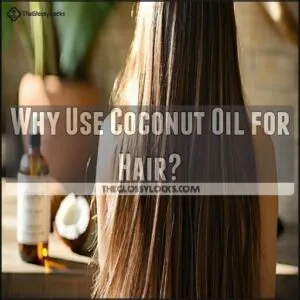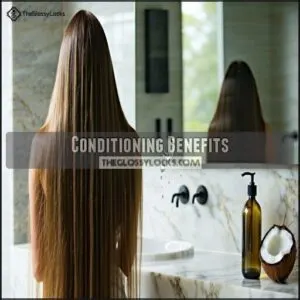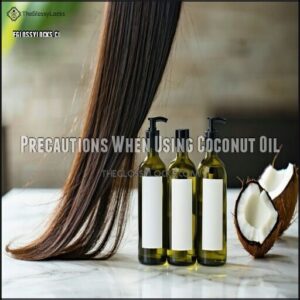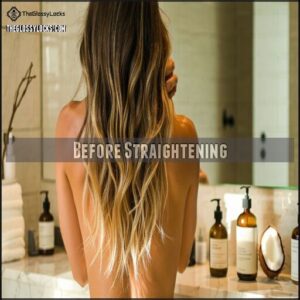This site is supported by our readers. We may earn a commission, at no cost to you, if you purchase through links.

As a bonus, it works as a heat protectant, shielding your strands from damage during straightening. To use it, warm a small amount until it melts, then apply evenly to damp hair before blow-drying or flat ironing.
But don’t go overboard—too much oil can leave your hair greasy. Curious about other tips for silky-smooth results? There’s more to explore in this hair care secret.
Table Of Contents
- Key Takeaways
- Why Use Coconut Oil for Hair?
- Properties of Coconut Oil
- How to Use Coconut Oil for Hair Straightening
- Precautions When Using Coconut Oil
- When to Avoid Coconut Oil for Hair
- Alternative Oils for Hair Straightening
- Using Coconut Oil as a Heat Protectant
- Best Oils for Hair Straightening
- Frequently Asked Questions (FAQs)
- What oil is best for straightening hair?
- Does coconut oil help with heat damaged hair?
- How can I straighten my hair naturally?
- How often should I use coconut oil for hair straightening?
- Can coconut oil help with split ends?
- Is coconut oil effective for color-treated hair?
- Can coconut oil reduce hair loss when straightening?
- How does coconut oil compare to keratin treatments?
- Conclusion
Key Takeaways
- Use coconut oil sparingly as a heat protectant before straightening to reduce frizz, lock in moisture, and create a protective barrier against heat damage.
- Apply coconut oil evenly from mid-length to ends on damp hair and let it absorb for 15-30 minutes before styling to avoid greasiness.
- Coconut oil’s lauric acid deeply penetrates hair shafts, reducing protein loss, repairing damage, and leaving strands smooth and sleek.
- Avoid overusing coconut oil if you have fine, low-porosity, or protein-sensitive hair, as it can cause buildup, greasiness, and dryness.
Why Use Coconut Oil for Hair?
Coconut oil stands out from the crowd as a natural protector for your hair straightening routine.
You’ll love how this miracle oil creates a protective barrier against heat damage while delivering essential nutrients directly to your strands. Rich in fatty acids, it penetrates hair shafts more effectively than most oils, preventing breakage during styling.
Its natural protection properties enhance moisture retention, leaving your locks silky-smooth instead of frizzy. If you’re tired of chemical-laden products, coconut oil offers a gentle alternative that nourishes while it protects.
Your hair deserves this natural hair straightener’s benefits! It can also improve scalp health by reducing inflammation and promoting healthy growth.
Properties of Coconut Oil
Coconut oil stands out for its unique composition of fatty acids, including lauric acid, which deeply nourish and protect hair.
Deeply nourish and protect your hair with the unique fatty acids in coconut oil, including the powerhouse lauric acid!
Its ability to penetrate the hair shaft helps reduce protein loss, making your hair smoother and more resilient.
Fatty Acids
Did you know the fatty acids in coconut oil are the secret behind its remarkable conditioning powers? Lauric acid, a medium-chain fatty acid (MCFA), dives deep into the hair shaft, locking in moisture and strengthening your strands from within.
Oleic acid adds extra softness and keeps your hair manageable, while palmitic and stearic acids act as your hair’s heat defense team, offering protection during straightening sessions.
What’s more, these fatty acids work together to create a lightweight, waterproof shield around your hair. This barrier helps prevent frizz, split ends, and heat damage while giving your hair a silky, glossy finish that lasts.
Here’s why fatty acids in coconut oil make all the difference:
- Locks in moisture for long-lasting hydration.
- Protects against heat and styling damage.
- Enhances smoothness and shine.
- Reduces frizz and split ends.
- Strengthens hair from root to tip.
Hair Penetration
Your hair thrives when it gets exactly what it needs, and one of coconut oil’s superpowers is its ability to penetrate deep into the hair shaft.
One of coconut oil’s superpowers is its deep penetration into hair shafts, delivering unmatched nourishment and moisture where it’s needed most.
Thanks to its low molecular weight and straight chain structure, it reaches the cortex quickly, delivering essential fatty acids where they’re needed most. This unique property helps lock in moisture, protect hair structure, and minimize damage from styling or heat exposure.
Here’s why cuticle penetration works wonders:
- Cortex Absorption: Nourishes deep layers of hair.
- Oil Saturation: Prevents brittleness by sealing moisture.
- Hair Structure Repair: Reduces protein loss, encouraging strength.
- Split End Prevention: Shields strands from breaking.
- Controlled Frizz: Smoothens and tames flyaways.
With effective cuticle absorption, coconut oil transforms hair from the inside out!
How to Use Coconut Oil for Hair Straightening
Applying coconut oil before straightening protects your hair from heat damage, locks in moisture, and enhances smoothness.
With its unique ability to penetrate deep into the hair shaft, it reduces protein loss while ensuring sleek, manageable results, which helps in achieving smoothness.
Conditioning Benefits
For soft, shiny, and manageable hair, incorporating coconut oil into your routine can work wonders.
Packed with fatty acids, it penetrates deeply, nourishing each strand while reducing frizz and repairing damage.
By locking in moisture, it helps retain hydration, leaving your hair silky and smooth without feeling heavy.
When used as a pre-straightening treatment or conditioning step, coconut oil adds a protective layer, making heat styling less damaging over time.
Regular use can improve overall hair manageability, ensuring your hair doesn’t become a tangled mess after every wash.
Whether you’re prepping for straightening or simply need a conditioning boost, the benefits of coconut oil make it an essential tool for healthy, moisturized, and resilient hair.
Heat Protection
After conditioning, coconut oil steps in as a reliable heat protectant during hair straightening.
Its unique ability to coat strands creates a barrier that resists heat and minimizes damage. Warm a small amount, apply evenly from mid-length to ends, and avoid roots—this prevents oil buildup.
For extra hair protection, blend it with grapeseed or argan oil to enhance hydration and reduce split ends.
Discover more about coconut oil uses for various applications. Adjust oil layering based on your hair type and straightening frequency for smooth, sleek results without sacrificing volume or health, ensuring a reliable hair protection method.
Precautions When Using Coconut Oil
When using coconut oil for straightening, keep a few things in mind to avoid problems. Start with a small amount after your shower—too much can lead to a greasy appearance.
Pay attention to how your hair type reacts. If you experience scalp irritation, clogged pores, or protein buildup, it mightn’t be the best choice.
Protein-sensitive hair can become dry or brittle due to coconut oil’s tendency to mimic protein. Test on a small section first to check for allergic reactions or unwanted effects like hair breakage.
Always choose high-quality, cold-pressed oil to guarantee better hair shaft penetration without irritation. When applied moderately, coconut oil creates protection and adds nutrients without weighing hair down.
When to Avoid Coconut Oil for Hair
Coconut oil is a fantastic hair treatment, but it’s not for everyone.
If you’ve noticed brittle strands or excessive greasiness, it mightn’t suit your hair type. For some, it can lead to protein sensitivity or worsen scalp irritation, particularly if your scalp is naturally oily or prone to dandruff. Overusing it may even result in product buildup, which can weigh hair down and cause breakage.
To know if coconut oil isn’t for you, watch for these signs:
- Protein Buildup: If your hair becomes dry or stiff after use, it may not tolerate coconut oil’s high fatty acid content.
- Allergic Reaction: Test on a small area first if you’re unsure about sensitivity.
- Low Hair Porosity: Coconut oil can sit on the surface, blocking moisture absorption.
- Fine Hair Issues: Thin hair types may experience limp locks or greasy roots.
Coconut oil’s large molecule size means it may not be ideal, especially for those with low porosity hair. When in doubt, apply sparingly and adjust based on how your hair responds.
Alternative Oils for Hair Straightening
If coconut oil isn’t the right fit for your hair, other oils like argan and grapeseed can offer excellent alternatives.
These oils provide heat protection, reduce frizz, and help maintain smooth, straight hair with their unique nutrient profiles.
Grapeseed Oil
If coconut oil doesn’t suit your hair, grapeseed oil is a fantastic alternative for hair straightening.
Its lightweight texture and high heat resistance make it ideal for protection without greasiness. Grapeseed oil benefits include deep conditioning, reduced frizz, and a healthy shine.
Grapeseed oil is also known to provide protection against UV rays.
Suitable for most hair types, it’s especially great for fine or thin hair. Use just a few drops on dry ends before styling.
Blending oils like grapeseed with others enhances results, ensuring smooth, nourished hair with minimal effort.
Argan Oil
Argan oil is a game-changer for hair straightening, thanks to its lightweight texture and nutrient-packed formula.
Rich in vitamin E, fatty acids, and antioxidants, it nourishes your scalp and promotes overall scalp health while delivering a sleek, polished finish.
Unlike coconut oil, which some may find too greasy or irritating, argan oil absorbs quickly, leaving no heavy residue.
This makes it ideal for any hair type—straight, curly, thin, or thick.
To use, apply a small amount to damp hair, focusing on the mid-lengths and ends.
It works wonders as a heat protector, shielding your strands from damage caused by styling tools.
Argan oil’s natural smoothing properties also tame frizz and add shine, giving your hair that silky-smooth look.
Opt for high-quality, pure argan oil for the best results.
Your hair will thank you!
Using Coconut Oil as a Heat Protectant
Using coconut oil before straightening helps protect your hair from heat damage, thanks to its ability to create a lightweight barrier around each strand.
Its molecular structure allows it to penetrate deeply, keeping your hair moisturized and reducing protein loss during styling.
Before Straightening
Preparing your hair before straightening is essential for protecting it from heat damage and achieving sleek results.
Coconut oil acts as a natural shield for your strands, reducing protein loss while sealing in moisture.
For best results, keep these tips in mind:
- Oil distribution matters: Apply a few drops evenly from mid-length to ends, avoiding the roots.
- Timing is key: Let the oil absorb for 15-30 minutes before using heat tools.
- Hair preparation counts: Start with clean, towel-dried hair to prevent buildup.
- Choose wisely: Use organic, cold-pressed coconut oil for maximum benefits.
- Amount needed: A small quantity goes a long way—too much can weigh hair down.
Consider using certified organic options for purity.
This simple coconut oil treatment guarantees smooth, protected hair before styling!
Overnight Mask
For an intense boost before straightening, try an overnight treatment.
Warm a small amount of organic coconut oil in your hands and evenly apply from mid-lengths to ends, avoiding the scalp to maintain scalp health and prevent greasiness.
Tailor application frequency to your hair porosity—low porosity needs less oil.
Leave the mask for the ideal duration (overnight), letting the nutrients deeply penetrate.
This hair mask softens strands, repairs damage, and enhances heat resistance.
Rinse thoroughly, revealing silky, manageable hair with lasting coconut oil benefits.
Best Oils for Hair Straightening
If you want silky, straightened hair without frying it, natural oils are your best ally.
Coconut oil stands out for heat resistance and hair smoothing, thanks to lauric acid. Grapeseed oil works wonders for heat styling, especially for protein-sensitive hair types.
Argan oil, packed with vitamin E, adds strength and shine while being lightweight. Sunflower oil can also be incorporated to enhance shine, as it boosts hair’s softness.
To maximize benefits, focus on light application methods—start small to avoid greasy strands. With these options, hair straightening becomes healthier, blending protection with gorgeous, vibrant results.
Frequently Asked Questions (FAQs)
What oil is best for straightening hair?
In the context of hair straightening, lightweight oils like argan oil, grapeseed oil, or coconut oil can do wonders.
They provide heat protection, reduce frizz, and smooth strands, leaving your hair sleek and healthy-looking.
Does coconut oil help with heat damaged hair?
Coconut oil helps repair heat-damaged hair by deeply moisturizing, reducing protein loss, and strengthening hair strands.
Its essential fatty acids penetrate effectively, restoring shine, taming frizz, and creating a protective barrier to prevent further damage, which helps in repairing heat-damaged hair.
How can I straighten my hair naturally?
Straightening your hair naturally takes patience.
Use aloe vera gel or milk sprays to relax curls. Braiding damp hair overnight can reduce waves.
Avoid heat tools, and gently brush when dry for a smoother, straighter look.
How often should I use coconut oil for hair straightening?
Use coconut oil 1-2 times weekly for hair straightening.
Overdoing it can make hair greasy, while regular use creates a protective barrier, locking in moisture, taming frizz, and shielding strands from heat damage effectively, which helps in hair straightening.
Can coconut oil help with split ends?
Split ends are like tiny cracks in the road of your hair’s health.
Applying coconut oil helps seal those ends temporarily, reducing further damage.
Its fatty acids nourish and strengthen strands, adding softness and shine.
Is coconut oil effective for color-treated hair?
For color-treated hair, it works as a natural protector.
Its fatty acids seal moisture, shielding strands from dryness and damage.
Just use sparingly—too much can weigh hair down or dull your vibrant color.
Can coconut oil reduce hair loss when straightening?
Research shows coconut oil reduces protein loss in hair by up to 39%, safeguarding strands during straightening.
It creates a protective barrier, minimizing heat damage, which can otherwise lead to breakage and hair loss over time.
How does coconut oil compare to keratin treatments?
Coconut oil nourishes and protects hair, while keratin treatments smooth and strengthen strands by bonding to the hair’s surface.
Keratin lasts longer but involves chemicals, whereas coconut oil offers a natural alternative for daily care.
Conclusion
Much like finding the perfect balance in any recipe, using coconut oil for hair straightening requires a precise approach.
With its deep-penetrating fatty acids and natural heat-protectant properties, coconut oil can transform your hair into sleek, silky strands while reducing frizz.
Apply sparingly for best results and pair it with proper straightening techniques to avoid greasiness.
Whether used as a pre-styling protectant or an overnight conditioner, this natural ingredient is a versatile addition to your hair care routine.













